How to Ask the Right Questions at a Farmers Market
Buying fresh, organic and locally grown is more popular than ever before, and that means farmers’ markets are more in demand and they’re big money makers too. That’s a good thing! Local farmers have an easy way to sell their fresh produce and connect directly with the community and local folks can access locally grown freshly harvested food.
But, is it all that it seems? How do you know what you are getting is really a “clean food”? Is it really fresh, local, organic, and/or grown without chemicals? Unfortunately, “greenwashing” is more common than you may think, with sellers buying industrial produce at wholesale prices and passing off as homegrown. The other major problem that I find at the local markets is that there is a huge disparity in how each farmer decides to grow their food. Some use no chemicals, some use several chemicals and some use certain soil amendments which can make an otherwise locally grown food more likely to contain heavy metals or toxins. I’ve seen it all far too often, and I now understand that you have to ask the right questions in order to know what you’re really getting.
All information in this article is for educational purposes only.
It is not for the diagnosis, treatment, prescription or cure of any disease or health condition.
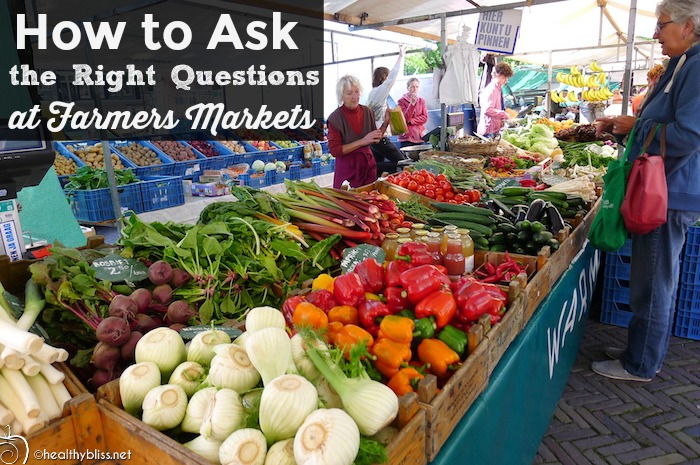
Is it organic, locally grown, non-GMO…or other?
By knowing what to ask, you can quickly decipher what’s worth buying and when to simply keep walking. You absolutely cannot trust the look of a stall filled with baskets of produce or the “Support Local” t-shirts worn by staff. They are often banking on your perception of what appears freshly harvested and organic. That said, there are often several vendors doing things right from start to finish and those are the ones you want!
To make things easy for you, I’ve created a list of key questions to ask vendors about their farming philosophies and daily practices. The questions fall into three main categories: Where the food came from, how it was grown, and how it was raised. I’ve divided the subject areas into produce, eggs and cheese since those are the main things people tend to buy at markets. But you can also apply these principals to fresh baked goods, meat and fresh fish too.
Farmer’s Market Guide: How to Approach Vendors
Checking for fraudulent produce at the farmers market is important, but needs to de done correctly for good results.
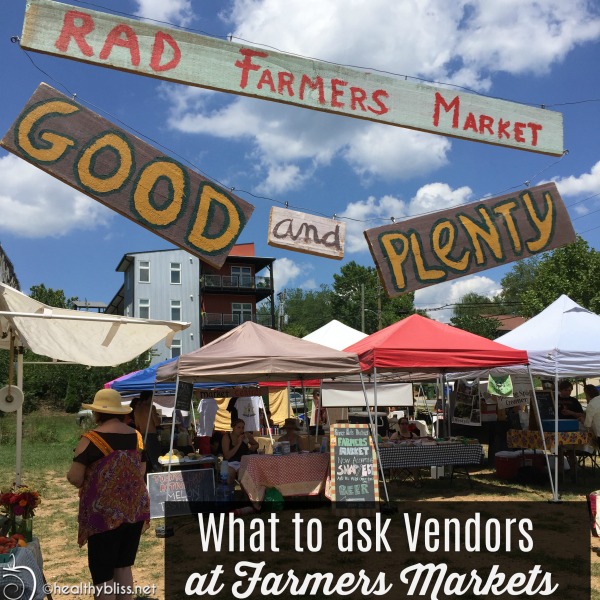
How can you be sure what you are getting is locally grown? ASK!
How to approach vendors and what to look for:
- Approach the vendor in between customers, and preferably when the stall is empty. Do not barge into a booth with a long line of customers and start rolling off questions. You don’t want to cause panic or ruin someone’s business.
- Be polite. Your goal is to get information, not to prove someone wrong. Do not assume the worst and don’t approach a vendor with a negative or accusatory tone. If you are gentle, polite, quietly inquisitive and smile, you’re much more likely to get the answers you need.
- Get to the point and ask your questions quickly. Vendors are busy and they’re working! They don’t have time for an hour-long discourse on the subject of organic and sustainable food practices. Just from a few questions, you will know whether you should buy there or not.
- Have a quick peek behind the booth and under the tables. If you see new supermarket boxes of produce, you should be suspicious. I’ve seen this at farmer’s markets in Australia where the vendors for sure were selling greenwashed produce (and customers were buying!). I’ve also seen it here in North Carolina.
- Know your local seasons for produce. It’s your job to get informed if you want to know your food. Alarm bells should already be ringing if you see strawberries sold in late spring or cucumbers sold in winter, for example.
Fruit & Veggies at Markets: What to Ask
Not all vendors at farmer’s markets are selling certified organic goods, and that’s actually ok (or at least not always a bad thing). Many small farms simply cannot afford to go through the lengthy and expensive process of getting an organic certification. Selling non-certified produce means that you are not allowed to market your goods as “certified organic,” but you are permitted to use terms like “grown without pesticides” or “grown using sustainable permaculture practices.” Don’t be scared of those phrases. Whether it’s certified organic or not, you still need to do more detective work.
It’s all a good practice to ask these questions before signing up for any local Community Supported Agriculture (CSA) delivery service.
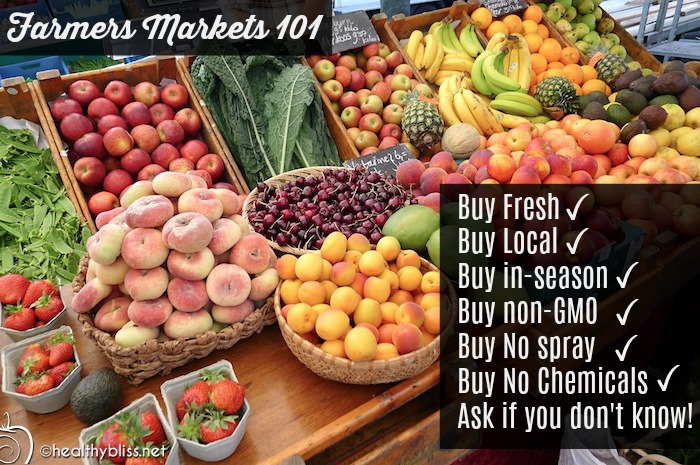
Don’t be afraid to ask questions, just remember to be polite and respectful
Questions for Produce Vendors
- Where was this grown?
Hopefully the answer is: at our XYZ farm just down the road. Obviously if the answer is “Mexico” or elsewhere, you’re ready to go to the next stall (unless you’re actually in Mexico, of course!).
- Do you use anything for pests or disease?
A good answer to this is: We let nature run its course and occasionally hand-pick pests like squash vine borers or cabbage worms. Another ok answer is: We use vinegar, water and baking soda to minimize blight. Or: We use traditional companion planting techniques. What you don’t want to hear is a bunch of chemical names that you never heard of. Even certified organic farming allows the use of certain pesticides, however many of those are widely known to destroy local honey bee populations. Not everything organic is better, as you can see.
- What type of fertilizer do you use?
You want to hear something like: We use compost from rabbits fed certified organic feed OR we make our own compost on-site using organic veggie scraps and un-sprayed leaves OR we add XYZ brand of certified organic compost OR we plant cover crops in the fall and practice plant rotation. What you don’t want to hear is: I collect garbage bags of leaves from all over town when it’s time for leaf pick up and I use those. You can imagine that many of those leaves would come from lawns heavily sprayed with chemicals (and yes, I had someone give me that exact answer before!).
- Do you add Diatomaceous earth (DE) to the soil?
To this, you want to hear a clear and definite NO. If the answer is yes, or even yes we add it to the chicken coop and spread chicken manure on the soil, then politely walk away! This stuff is an absolute disaster of a product, sold as a miracle cure to amend soil with nutrients and ward off disease. It’s touted on every online farming forum there is (most likely advocated by industry trolls). While DE may be naturally occurring and is permitted for use in certified organic farming, it is also high in arsenic. Arsenic is a heavy metal; it’s deadly and causes cancer. Plants pull arsenic from the soil through their roots and into the roots, leaves, stem and fruit. This is just one of many reasons why even organic fruits and vegetables are becoming more contaminated with heavy metals than ever before. I’ve personally seen several clients get very sick from taking DE capsules as a “so-called” detox supplement, and they were absolutely not having a detox reaction; rather a toxicity reaction.
A sense of reluctance or hesitation in providing you an answer to any of the above questions should be yet another warning that you may have tapped into something that the vendor does not want to disclose (or doesn’t know, which is also not a good sign).
By asking these questions, I’ve been able to find clean and reliable organic produce vendors, but on average it’s about 2 in 10 that are ok in my book.
Local Eggs at Markets: What to Ask
Questions for Local Egg Vendors
- Are these from your chickens, and where is your farm?
I would hate to think that someone would buy supermarket eggs and try to flog them at a farmer’s market! I’ve never seen this happen myself, however I’m sure there’s always a first. Still, it’s definitely worth it to ask and can be a gentle way to open the conversation.
- What kind of feed do you use?
A good answer to this is: We use only non-GMO organic feed and supplement it with our own organic veggie scraps. If their answer is more vague, such as: We feed them alfalfa, barley, corn and other whole grains, then you must ask: Are they all non-GMO? If the answer is no, then definitely walk away! Genetically Modified (GMO) grains can be high in pesticides such as glyphosate and they can also be high in certain heavy metals, such as arsenic, lead and cadmium. The feed doesn’t necessarily have to be certified organic, but at a minimum it should be non-GMO.
- Do you add Diatomaceous earth (DE) to the chicken coop or to the feed?
Again, you most definitely want the answer to this to be: NO! Many uninformed farmers are adding DE to their coop as a so-called “natural” pest control to kill mites and fleas. However, DE is a known carcinogen when inhaled. Yes, it’s true. Why anyone would ever want to add this junk to anything knowing that is beyond me. However, they are “told” that it’s ok and to just wear a mask when you are applying it. (But don’t worry about eating eggs from chicken with cancer? Ummm….really?) DE is also often added to the feed and it’s totally legal to do this with 100% certified organic eggs. The problem in both cases is that the chickens will ingest the DE. While proponents of DE claim that the arsenic is in its “organic” and therefore not harmful to humans, the reality is that chickens are able to convert organic arsenic into the more dangerous non-organic form of arsenic in their digestive track. I don’t know about you, but I don’t want any concentrated forms of arsenic in any of my food!
Often times, you’ll be surprised to find that the non-organic local egg producer is actually selling better quality eggs with less contaminants than the certified organic egg farmer. This is why it’s so important to ask the right questions!
Local Cheese at Markets: What to Ask
Questions for Local or Artisanal Cheese Vendors
- Are these from your cows, goats or sheep, and where is your farm?
Hopefully you’re starting to get the gist of this by now! Some FYI though: it is not uncommon for local cheese producers to buy their milk from a separate dairy farm. Especially if the cheese artisan is making small batches of cheese. So, don’t freak out if you are told – no, we buy the milk from XYZ farm down the road and we make the cheese on-site at our production facility. If you hear that, then go to #2 and continue with your next question. What you definitely do not want to hear is: We buy pasteurized non-organic milk from the supermarket or we buy this cheese in bulk from Costco (as an example) and just package it down for sale.
- What kind of feed do you use?
A good answer to this is: We use only non-GMO certified organic feed OR we use only non-GMO feed. If their answer is more vague, such as: We feed them alfalfa, barley, corn and other whole grains, then you must ask: Are they all non-GMO? If the answer is no, then definitely walk away! GMO grains can be high in pesticides such as glyphosate and they can also be high in certain heavy metals, such as arsenic, lead and cadmium. The feed doesn’t necessarily have to be certified organic, but at a minimum it should be non-GMO. Pretty much same as eggs.
- What are the ingredients? (Also, if yellow or orange cheese: How did you get this color?)
I was absolutely shocked to find SULFITES as an added ingredient in some cheeses in Holland. Especially since The Netherlands is supposed to have the “best” cheese in the world! Sulfites are a chemical preservative that can cause headaches, wheezing, coughing or asthma in people who are sensitive. For the color of the cheese, if it’s yellow or orange in color – you should ask: How did you make the color? I’ve had people tell me that the “natural color” is made from carrots, only to look on the label and see ANNATTO added for coloring. People who are sensitive to Monosodium Glutamate (MSG) or glutamates can also get an inflammatory reaction from Annatto. You also want to make sure there is NO garlic salt, garlic powder or onion powder added to any cheese as these ingredients can contain hidden MSG. Basically, the answer you want to hear is some version of: Rennet, milk, salt, fresh organic herbs such as dill or parsley and NO added coloring.
Using the questions above, I’ve identified two very popular local artisanal cheese outlets/vendors in the Asheville NC area selling seasonal cheese made from milk whose cows or goats are fed 100% genetically modified (GMO) feed.
Now, I’m not here to name and shame and I’m definitely not here to put the small local farmer out of business. But, does it bother me that they are selling a small piece of GMO cheese for $14.99 or more? Heck, yeah! Crowds of customers are wooing over their products, and no one has a clue that the stuff is neither organic nor GMO-free. Not to mention that they are supporting GMO dairy farming, which is a total disaster for the local honey bee population and also contaminates local groundwater. Since most people where I live rely on untreated well water for drinking and on honey bees for pollination of their crops, these things become very important very quickly.
Shop Smart and You’ll be Fine!
Hopefully you now feel more secure in knowing the right questions to ask at your local fruit & veggie market. It’s definitely worth your time and effort to ask – after all, you pay good money for farmer’s market items. As long as you have a bit of a “Buyer Beware” mindset, you can still find good fresh locally grown food that’s healthy and enjoyable for you and your family.
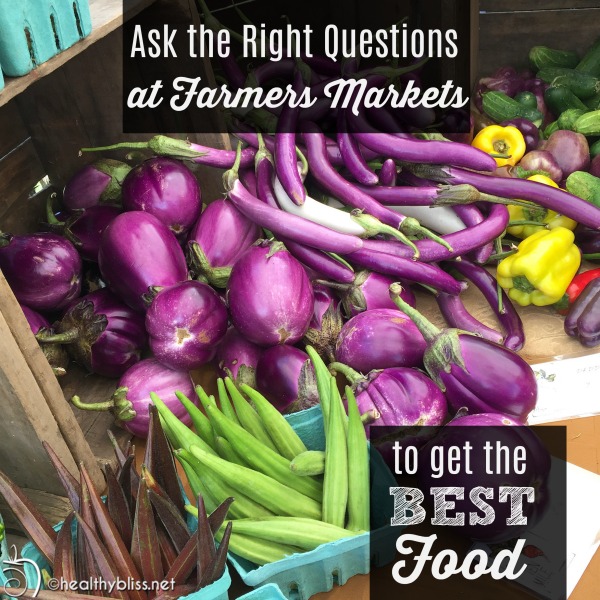
You CAN find GREAT healthy local food at your local markets!
At our local markets here in Western North Carolina, I’m known as the “you asked me that last week” shopper. Oops, sorry! After several passes through my regular markets and asking everyone questions, I now know who I can trust. Over time, it becomes easier because you can go straight to the stalls you know are ok.
Once you get home, you may be wondering: What’s the best way clean my fresh veggies? Not to worry, I’ve got it covered here: How to Clean Fresh Fruits and Vegetables.
Do you have any questions that you like to ask at your local farmer’s market? If so, please share in the comments below. Good luck and happy shopping!









How to Book Your Health & Nutritional Coaching Session:
1. Take photos of your eyes with a digital camera.
2. Email the photos to me for approval.
3. We schedule a time to meet via phone or Skype!
More on Organic Farming:
- Images of Natural, Healthy Hawaii…
- Our Farmhouse Kitchen for under $3K!! Before and After DIY Makeover
- Protein Powders containing Mercury, Lead, Arsenic and Cadmium: WARNING!
- Organic Vegetarian Food & Raw Restaurant in Dubai, UAE
- How to Clean Fresh Fruits and Vegetables
More on Fermented Foods:
- Raw Detox Salad Recipe
- Benefits of Raw Apple Cider Vinegar
- How to Make Kombucha, a Naturally Fermented Health Drink
- The last time I got sick was…
- How to Ferment Cabbage and Make Raw Sauerkraut
SaveSave
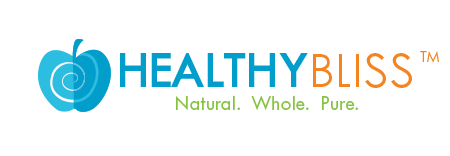
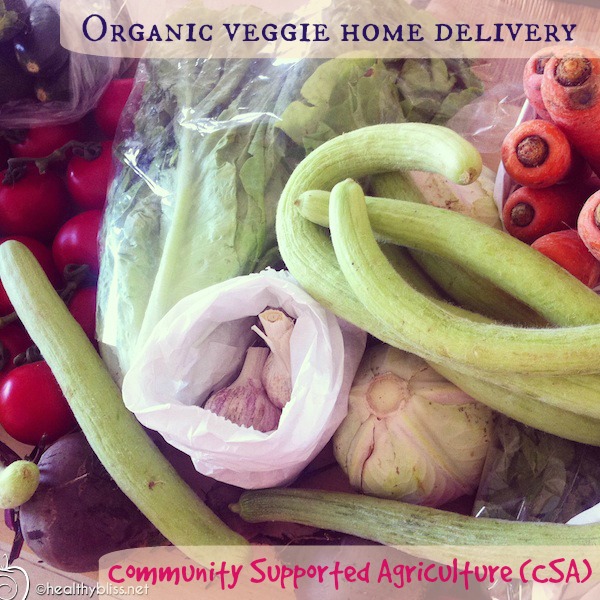







Follow Jennifer